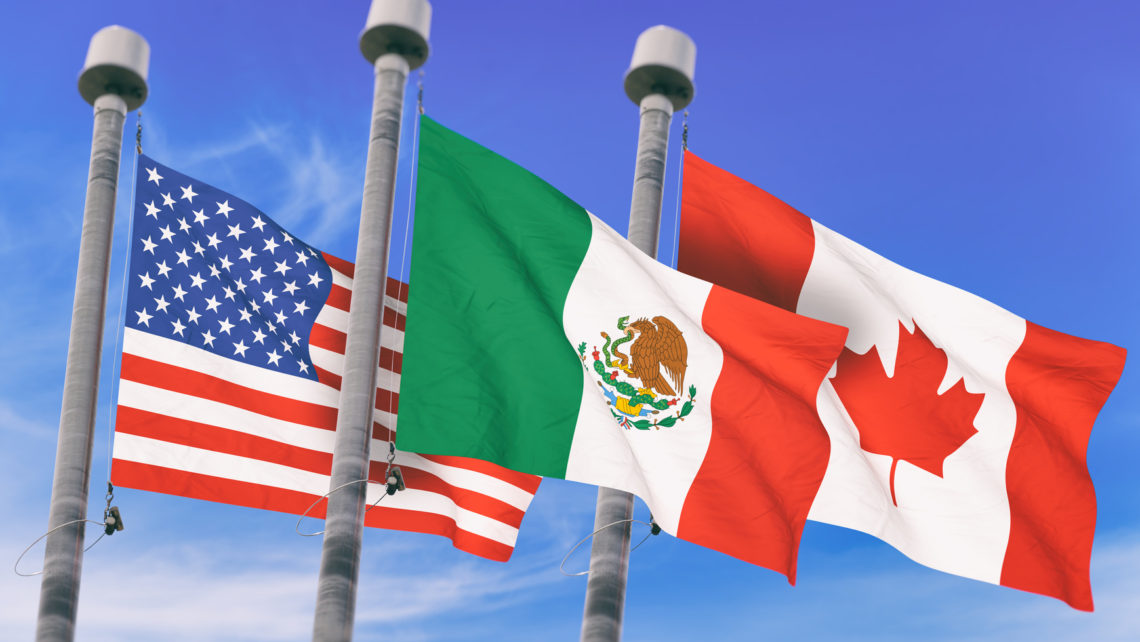President Trump and his Republican allies have been debating negotiations to the terms of the NAFTA agreement. If he cannot find a workable compromise, the president has threatened to begin withdrawing from the deal. This could have a drastic effect on any trucking business across the continent the operates as a cross-border carrier.
What is NAFTA?
The North Atlantic Free Trade Association was founded in 1994 as an economic partnership between the US, Canada, and Mexico to gradually reduce or eliminate tariffs (special taxes on imported goods) on all manufacturing.
While seemingly disconnected from the average consumer, NAFTA directly affects the transportation companies that conduct international business. Free trade has promoted the trucking industry to cross borders and expand into new markets.
The Trump NAFTA Negotiations
Left-leaning politicians praise free trade as a way to meet the globalization of the modern era and to prevent trade wars, but so-called protectionist on the right want to shield the US markets from foreign competition.
In May 2017, President Trump announced plans to renegotiate the terms of the trade deal to better secure US jobs. Tense debates in Congress have intensified as we draw closer to the midterm season and a July Mexican presidential election.
The exact economic benefits of NAFTA are proving difficult to calculate over its 25-year lifespan among different trends. Since the early 90s, many factors have shaped the global economy, notably the explosion of the Internet.
It’s also not entirely clear why Trump is against NAFTA, though mostly he has cited trade deficits with Mexico and the fact that major US dealers, like Ford, have moved their production facilities to out of the country.
However, we can certainly say that the trucking industry will have a direct negative effect if Trump decides to impose tariffs on participating NAFTA countries. Cross-border transportation companies would have to compensate for the new costs, possibly by terminating long-standing deals with international customers or laying off drivers.
Mexican Carrier Limit
Most of the NAFTA talks remain confidential behind closed doors, but information has leaked of a proposed restriction on Mexican transportation carriers operating in the US. Allegedly, the new amendments will only permit Mexican truckers to haul within a small sector near the US border.
Historically, Mexican carriers have always had a tense relationship with NAFTA. The terms of the original deal sparked outrage and protest throughout the border from the US trucking community. Transportation lobbyists claimed the open road border would destroy American job security and present a safety risk for carriers. Even though the deal under Clinton appeared to promise full access, it wasn’t under 2015 that Obama allowed the first Mexican truckers to deliver to any part of the US.
Though only a small number of Mexican based truckers operate within the US, Mexico is the 3rd largest trading partner to the US, significantly in textiles exports.
Steel and Aluminum Tariffs
In March 2018, President Trump rolled out long-awaited steel and aluminum tariffs, 25% and 10% respectively, against China and other trade partners around the world. Yet, he chose to delay implementing the duty taxes against Canada and Mexico for 30 days in hopes to extend NAFTA negotiations. If governments don’t strike a deal in this period, trucking companies will have a difficult time doing international business in with those loads.
Possibly NAFTA Withdraw
If the US did completely withdraw from the trade deal, it would be a 6-month transition phrase. Many lawyers have argued the president doesn’t have the constitutional authority to leave an international trade deal without the consent of Congress. Even then, the World Trade Organization would still enforce standard duty rates on countries in the event we scrapped NAFTA.
Last month, member nations finished their 7th round of NAFTA talks.
Free trade is generally good for the trucking industry as it allows for easy expansion into lucrative routes across Canada and parts of Mexico.
We’ll have to wait and see how the political landscape continues to develop.
